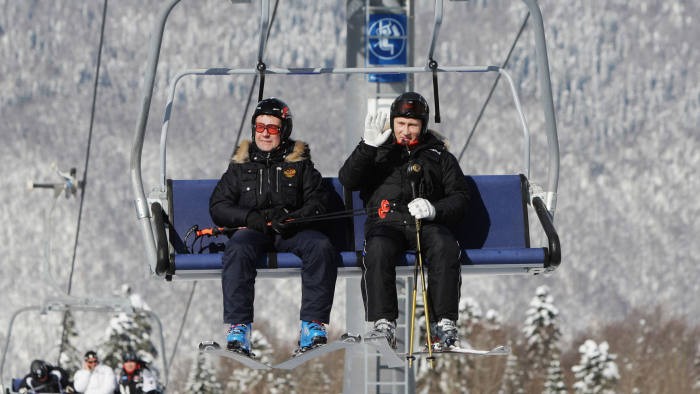Sochi stirs Circassian nationalism

Last week, Maykop was deserted as most people hid from the freezing rain pelting this quiet town in southern Russia. But today, thousands are expected to cram into Lenin Square. Before the Olympic torch reaches Sochi, where the Winter Olympics open on Friday, it is making its penultimate stop here, in one of the remaining homelands of the ancient but long-scattered Russian Circassian people.
Compared with the explosions, shoot-outs and terrorist threats from other parts of the north Caucasus, which have raised fears over security at the Sochi games, the story of the Circassians has been much less of an issue – although security has been heightened in Maykop despite the town having no record of radical activism or terror threats. Last week an armoured vehicle was parked next to the highway, and police and plainclothes officials stopped all cars and buses for identity checks, questioning everyone heading into town.
Yet the games have become a focal point for the fate of this people and a mirror of how President Vladimir Putin struggles to create a sense of national identity in his multi-ethnic domain.
“Sochi has awakened us,” says Samir Khatko, a scholar of Circassian history at the Adygean Republican Institute of Humanities Studies in Maykop. “The youth is becoming more politicised.”
To a large extent, Mr Putin’s own government is the unintentional driver of this renewal of Circassian feeling. In 2005, the Kremlin proposed merging the Republic of Adygea, one of three nominally autonomous territories for the Circassian people, with the surrounding Krasnodar region. That provoked the largest demonstrations Maykop, Adygea’s administrative centre, had ever seen.
Anger welled up again two years later when Mr Putin made his official pitch for Sochi. Addressing the International Olympic Committee, he praised the city’s rich history at the crossroads of cultures by saying: “The ancient Greeks lived around Sochi centuries ago.” He failed to mention the Circassians, on whose territory Sochi stood for centuries.
“This was perceived as an insult and really fomented Circassian activism around the world,” says Sufian Zhemukhov, a visiting scholar at George Washington University.
The historical sore point for the Circassian community is their expulsion from their ancestral lands, in the western Caucasus in the winter of 1864, during which at least hundreds of thousands died. It was an atrocity Circassian groups want recognised as genocide but which the Russian government refuses to address.
Krasnaya Polyana, the new billion-dollar ski resort for the Sochi games, is built on the site where most of the Circassians “cleansed” from the surrounding region froze and starved to death – almost exactly 150 years ago – as they awaited deportation.
Today, about 700,000 Circassians still live in the territory of the Russian Federation, with millions more in countries such as Turkey, Syria, Jordan, the US and Australia.
To many Circassians in Russia, Moscow’s reluctance to have a public discourse about their history reflects many of the larger ills of the Russian state. “The real problem is not the Olympics but the nature of federalism under Putin,” says a veteran Circassian community leader in Maykop. “There is supposed to be local autonomy but in fact no decisions are made at the regional level. Everything has to come from Moscow.”
Mr Khatko adds: “The entire ideological basis of the country comes from [Putin’s] imperial discourse.”
Russia is working on a new set of history textbooks after Mr Putin demanded they be reworked to present a unified set of evaluations and reflect a more patriotic world view. Circassian hopes to have their full story told could collide with this.
Like other ethnic minorities, Circassians were suppressed in the Soviet Union, with changes to the administrative status of their territories and restrictions on the practice of Islam and the teaching of their language. One of the main trends in the revived national movement is for Circassians to call themselves this name – a Turkish moniker by which they were historically known abroad – instead of Adyge, a name imposed by the Soviet government.
Mr Khatko remembers that he learnt about his identity only as a sixth-grade student in Ukraine. The father of a schoolmate, a Cossack lorry driver who got around a lot, told him that he was Circassian. “He explained to me that the Adyge, the Shapsug and the Kabardins are all one people with one language,” says Mr Khatko.
From then on he started searching for the truth from scattered mentions of individual historical events that appeared in literature or maps – “like one spaghetti, and another one, and I put them all together. It is a fact that Circassia for a long time had a status bordering on statehood”.
While some overseas groups have more radical demands, such as independent statehood, Circassian intellectuals in Russia hope to promote teaching of their language and preserve what little is left of their historic and cultural heritage.
Even that may be difficult, observers say. “Once the games are over,” write Bo Petersson and Karina Vamling in “The Sochi Predicament”, a study of the challenges of the host city published last year, “ [The Circassians] will risk returning to the status of an internationally little-known minority.”
